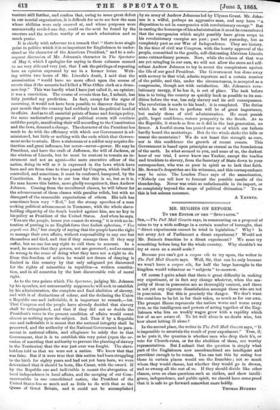MR. HUGHES ON REFORM.
To THE DITOR OF THE "SPECTATOR."
SIR,—The Pall Mall Gazette says, in commenting on a proposal of mine to try a wide suffrage in a certain number of boroughs, that "direct experiments cannot be tried in legislation." Why? Is not every Act of Parliament a direct experiment? Would not Mr. Baines's franchise be a direct experiment? We must try something before long for the whole country. Why shouldn't we try at once on a small scale ?
Because you can't get a corpus vile to try upon, the writer in- The Pall Mall Gazette says. Well, Sir, that can be only because we won't have a corpus vile, for half the large boroughs in the kingdom would volunteer as " subjects " to-morrow.
Of course I quite admit that there is great difficulty in making any experiment, or in fact any change whatever, when the ma- jority of those in possession are so thoroughly content, and there is not yet any vigorous dissatisfaction amongst those who are not in possession. But this is precisely the danger. We don't want the outsiders to be let in for their sakes, so much as for our own. The present House represents the nation worse and worse every year, as the intelligence and powers of acting together of the Eng- lishmen who live on weekly wages grow with a rapidity which few of us are aware of. To let well alone is no doubt wise, but how about letting ill alone?
In the second place, the writer in The Pall Mall Gazette says," It is impossible to ascertain the result of your experiment." True, if; as he puts it, the question is whether men who drop their h's, or vote for Church-rates, or for the abolition of them, are worthy representatives. But I submit that the question is simply what part of the Englishmen now unenfranchised are intelligent and provident enough to be voters. You can test this by seeing how those in certain places would use the franchise ; not so much whom they would choose, but whether they would go in droves, and so swamp all the rest of us. If they should divide like other classes, even on class questions such as strikes, and show intelli- gence, independence, and public spirit, we should have some proof that it is safe to go forward somewhat more boldly.
THOMAS HUGHES






























 Previous page
Previous page